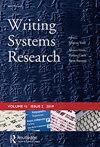Differential effects of age of acquisition and frequency on memory: evidence from free recall of pictures and words in Turkish
Q1 Arts and Humanities
引用次数: 7
Abstract
ABSTRACT The advantage of processing early over late acquired items in lexical and semantic tasks across a number of languages is well documented. Interestingly contradictory evidence has been reported in recall tasks where participants perform better overall on late acquired items compared to early acquired items in English. Moreover, free recall is modulated by frequency and list type in that studying pure lists of high-frequency words or low-frequency words typically leads to a recall advantage for high-frequency words. This recall advantage either disappears or is reversed when the same items are presented in mixed lists containing both high- and low-frequency items. The current experiment aims to shed light on this discrepancy by exploring the influence of Age of Acquisition (AoA) and frequency on free recall on standardised pictures and their names in Turkish. Eighty Turkish-speaking participants were assigned to either the picture (N = 40) or word condition (N = 40) in which stimuli were presented in either a mixed or a pure list. Following a distractor task, participants were asked to recall as many items as they could remember from the list they viewed. The findings and their implications are discussed within the context of current cognitive frameworks.习得年龄和频率对记忆的不同影响:来自土耳其语图片和文字自由回忆的证据
摘要在许多语言的词汇和语义任务中,早期处理项目比晚期处理项目的优势已经得到了充分的证明。有趣的是,在回忆任务中报告了相互矛盾的证据,与早期英语习得项目相比,参与者在后期习得项目上的总体表现更好。此外,自由回忆受频率和列表类型的调节,因为研究高频词或低频词的纯列表通常会导致高频词的回忆优势。当相同的项目出现在包含高频和低频项目的混合列表中时,这种召回优势要么消失,要么逆转。目前的实验旨在通过探索获取年龄(AoA)和频率对标准化图片及其土耳其语名称的自由回忆的影响来阐明这种差异。80名讲土耳其语的参与者被分配到图片(N = 40)或单词条件(N = 40),其中刺激以混合列表或纯列表的形式呈现。在分心任务之后,参与者被要求从他们查看的列表中回忆尽可能多的项目。这些发现及其含义是在当前认知框架的背景下讨论的。
本文章由计算机程序翻译,如有差异,请以英文原文为准。
求助全文
约1分钟内获得全文
求助全文

 求助内容:
求助内容: 应助结果提醒方式:
应助结果提醒方式:


